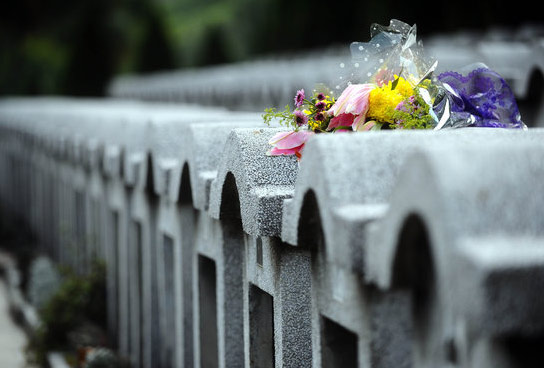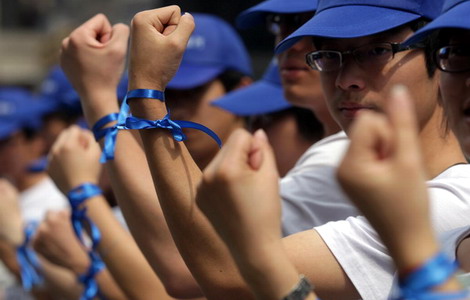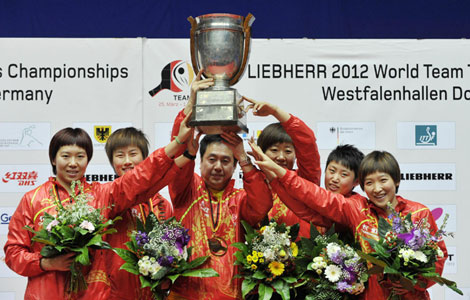 |
|
|
|
|||||||||
 |
|
Flowers are placed on a tombstone at a cemetery in Guangzhou, South China's Guangdong province in this March 27, 2012 file photo. [Photo/CFP]
|
These have become customs for funeral feasts in Xizhuosu village in Jinzhou, North China's Hebei province, under a cost-saving drive that is now playing out across the country.
The high cost of funerals has long been a complaint of the public, and discussion of the matter is sure to buzz around Tomb-Sweeping Day, China's traditional festival of remembering the dead, which falls on April 4 this year.
Its pitch may be particularly loud in 2012, after Dou Yupei, vice-minister of civil affairs, said during a national meeting on preparation for the festival that it was time to transform outmoded customs and make funeral affairs more frugal and environmentally friendly.
In some rural areas of the country, ways have already been found to guard against extravagant services.
Xizhousu, with a population of 2,050, established a wedding and funeral affairs committee in the 1990s, charging it with regulating and arranging the ceremonies.
Spending on a funeral is now limited to 2,000 yuan ($318), which is almost implausible considering widespread price rises.
The standards made by the committee save the village's residents 200,000 yuan every year, according to Wang Qingkui, head of the body.
Wang estimates a typical funeral would have cost villagers at least 10,000 yuan nowadays if the committee hadn't been created.
Xizhuosu posted 9,830 yuan in the annual income per capita measure in 2011, higher than neighboring rural centers. However, funeral and weddings still have scope to be an economic burden, if Chinese tendencies to "keep up with the Joneses" in arranging these occasions are not curbed by the committee.
Wang recalls that a family in the village once invited a theatrical troupe to perform nine plays for people attending a funeral, which alone cost 4,500 yuan.
"Firecrackers were set off around the clock during weddings and funerals, which was a real waste of money and posed safety risks. Every year, there were people injured," he adds.
Tradition has no chance
Under Chinese tradition, a funeral is a complicated and solemn rite. People used to make preparations for their afterlife in advance, choosing sites for burial and preparing coffins and burial garments. Emperors would spend decades to prepare mausoleums for their own death at tremendous cost.
"Funerals are a matter of dignity for the dead and a sign of filial piety for sons and daughters. That is why elaborate ones are common," explains Wang Xianyou, secretary general of the folk custom society in Anhui Province.
Wang Hong, a civil affairs official in Hebei, capital of Anhui Province, says that elaborate funerals are not rare in China.
Some families hire monks or Taoist priests to pray for the dead, and bands to play funeral music around the clock. Lavish banquets are commonly served.
On the drive to the crematorium, the hearse can be followed by a motorcade of dozens of vehicles, with funeral music blaring from speakers and fireworks erupting throughout the process.
In Hefei, funerals cost at least 20,000 yuan and may be as high as 500,000 yuan. Some families get into debt because of elaborate arrangements, according to Wang Hong.
The noise of firecrackers and bands is also unwelcome, he adds.
Elaborate funerals have brought burdens on families and the supply of land. It is necessary for the country to promote thrifty funerals and greener concepts for mourning the dead, believes Prof. Liu Zhonglin, an expert in folk culture.
In a green book on China's funeral services issued in 2011, the Ministry of Civil Affairs said the average spending on these occasions exceeded 8,000 yuan in Hebei Province, and most of that went on feasts, cigarettes and liquor.
Official statistics showed that 9 million people died in China in 2010, and 270 million attended funerals in the country.
"You can see how much can be saved if every funeral is held frugally," notes Liu.
Thrifty funerals advocated
Under the proposals of Dou Yupei at the national meeting, China will curb excessively high funeral charges by regulating the industry and reducing or remitting fees for low-income groups.
A Ministry of Civil Affairs pricing standard for basic funeral services, such as transportation and storage of the body, cremation and the handling of ashes, will be issued by local governments based on the costs of the services and the subsidies funeral-related businesses receive from the government.
The proposals will be of great interest for the wedding and funeral affairs committees that have been set up in most villages in Hebei, as well as in provinces including Hunan, Jiangxi and Henan.
The ministry has encouraged the committees to play a bigger role in transforming outmoded customs.
Meanwhile, the public has been urged to consider "green burials," such as burials at sea, which are usually free.

|

|

|

|

|

|